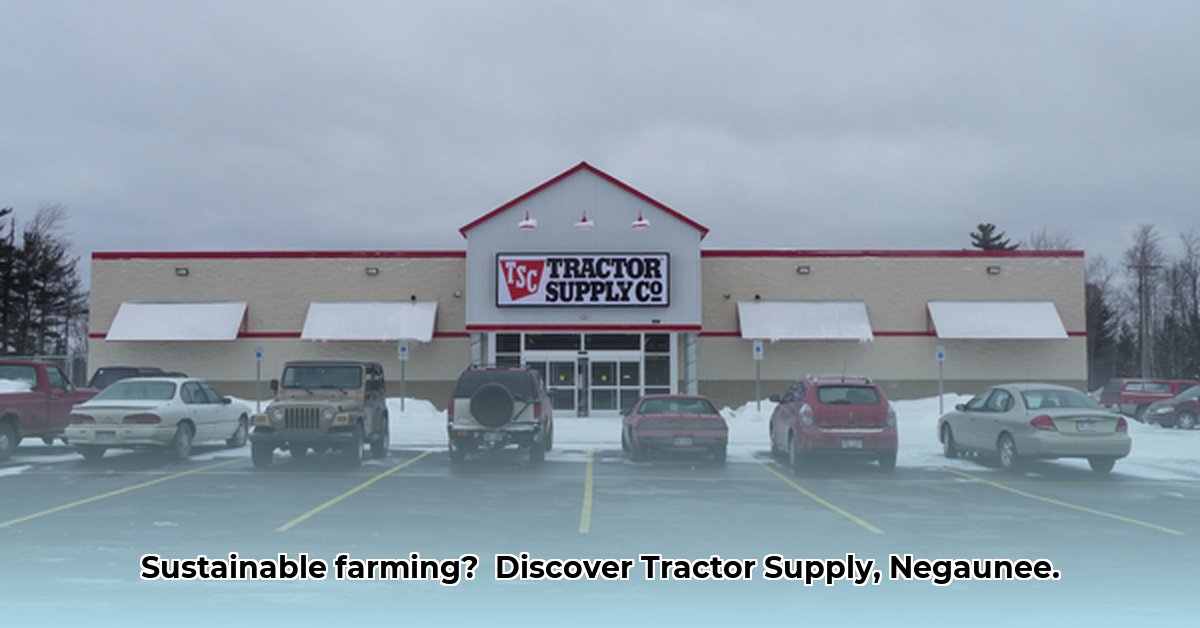
Tractor Supply Company (TSC) in Negaunee, Michigan, plays a vital role in the local community, providing essential goods and services to farmers, gardeners, and pet owners. However, its environmental impact, especially concerning sustainable agriculture, warrants further examination. For sustainable gardening options, check out these greenhouse kits. This article investigates TSC's contributions to Negaunee, assesses its sustainability practices, and proposes actionable steps for improvement.
Tractor Supply's Community Impact in Negaunee
TSC's Negaunee location serves as a central hub for agricultural and pet supplies, offering convenient access to essential goods for a wide range of residents. Its accessibility significantly benefits the community, providing farmers with readily available equipment and supplies, while also supporting local gardeners and pet owners. This convenience, however, raises questions about the broader environmental implications of its operations and supply chain. How does the ease of access affect transportation emissions? What's the environmental cost of delivering these supplies to a rural community?
Assessing Tractor Supply's Environmental Footprint: A Call for Transparency
A comprehensive assessment of TSC's environmental footprint in Negaunee is hampered by a lack of publicly available data. While TSC has demonstrated positive strides in reducing its overall carbon emissions, a full understanding of its sustainability performance requires a thorough investigation into several key areas:
- Product Sourcing: Where are the products sourced, and what are the environmental implications of their transportation? Knowing the origin and mode of transport is vital to calculating the carbon footprint.
- Packaging and Waste: What types of packaging are used, and how much waste is generated? What’s the company's waste management plan, and is it effective? This is critical data for measuring the store’s environmental impact.
- Supply Chain Emissions (Scope 3): This remains a significant area that requires further investigation. Scope 3 emissions, which encompass the entire supply chain, represent a substantial portion of a company's overall environmental impact. How effectively is Tractor Supply addressing this?
This lack of readily available data highlights the need for increased transparency from TSC regarding its sustainability efforts. A more thorough environmental audit is required to provide a complete picture.
Opportunities for a More Sustainable Future: Actionable Steps
Improving sustainability requires a collaborative approach involving Tractor Supply, local farmers and consumers, and the local government. The following steps offer a path towards a greener future for Negaunee:
1. Tractor Supply Company Actions:
- Conduct a comprehensive environmental audit: A rigorous audit would assess all aspects of the store's operations, from sourcing and transportation to packaging and waste management.
- Explore renewable energy sources: Transitioning to solar or other renewable energy options would significantly reduce energy consumption and carbon emissions.
- Implement eco-friendly packaging: Utilizing biodegradable alternatives or reusable packaging solutions will minimize waste.
- Enhance waste management: Developing a comprehensive recycling and composting program would reduce landfill waste.
2. Actions for Local Farmers and Consumers:
- Support sustainable businesses: Prioritize retailers committed to sustainable practices, encouraging a market-driven demand for environmentally friendly alternatives.
- Choose organic products: Selecting organic produce, wherever possible, will promote sustainable farming methods.
- Reduce chemical use: Minimize reliance on harsh chemicals through the adoption of natural fertilizers and pesticides.
3. Role of the Local Government:
- Offer incentives for sustainable farming: Providing tax breaks or subsidies for farmers adopting sustainable techniques would encourage wider adoption.
- Invest in improved infrastructure: Investing in high-speed internet access would enable remote ordering and reduce the need for frequent trips to stores, minimizing transportation-related emissions.
Conclusion: Building a Sustainable Agricultural Future in Negaunee
The sustainability of agriculture in Negaunee depends on collaborative efforts from all stakeholders. While Tractor Supply plays a critical role, the responsibility extends to local farmers, consumers, and the local government. Increased transparency from TSC on its sustainability initiatives, coupled with proactive measures from all parties, is crucial for building a thriving and environmentally responsible agricultural community. The lack of readily available data underscores the necessity for further research and investigation into TSC's overall impact.